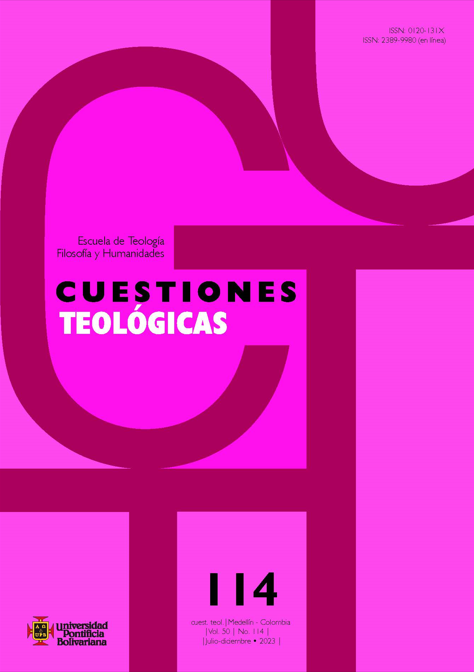Emotions and the resignification of reality in Laura Montoya Upegui
Main Article Content
Abstract
Given the growing interest in the life and work of Saint Laura Montoya Upegui, this article aims to locate, from the autobiography Historia de las misericordias de Dios en un alma, some strategies or resources used by the saint for the resignification of reality in the face of undeserved misfortune and uncontrolled circumstances. In the research process, the hermeneutic method of Hans-Georg Gadamer (1993) is applied, consideringintertextuality as a dialogic relationship, to establish a dialogue with the thought of the philosopher Martha Nussbaum. In society, within the global and the particular, the problems are there to remember their leading role in the human condition. These make visible the need to acquire awareness in the face of perpetual uncertainty. Therefore, one’s belief system, imagination and emotional self-knowledge become an important key to resignify reality, guide decisions and find meaning in a society indifferent to social problems and in which reigns a set of thoughts that are assumed as true and that can reflect the degree of freedom in decision-making or, on the contrary, lead to excessive normative theories that threaten human dignity. The above aspects are clear proof that in Laura Montoya's autobiography there is a thread of retrospective that allows her to recognize emotions, confirm who she is, live her greatest passion and find meaning in facing difficulties. Finally, these results represent only one step in the research process facing the work of a prolific writer.
References
Congregatio de causis santorum [Congregación para la Causa de los Santos]. (1990). Canonizationis servae Dei
Laurae a S. Catharina Senensi Montoya. Tipografía Guerra.
Gadamer, H.-G. (1993). Verdad y método. Sígueme.
Loyola, I. (1985). Ejercicios espirituales. Sal Terrae.
Masters, R. (2012). La evasión espiritual. Cuando la espiritualidad nos desconecta de lo que realmente importa. Vesica
Piscis.
Montoya, L. (2008). Beata Laura Montoya Upegui. Autobiografía. Bedout.
Montoya, L. (2015). La aventura misional de Dabeida. Cuéllar Editores.
Montoya, L. (2017). Historia de las misericordias de Dios en un alma. Autobiografía Santa Laura Montoya. Pontificia
Universidad Javeriana.
Nussbaum, M. (2018). El ocultamiento de lo humano. Panamericana Formas e Impresos S. A.
Nussbaum, M. (2019a). Emociones políticas. ¿Por qué el amor es importante para la justicia? Planeta.
Nussbaum, M. (2019b). Envejecer con sentido. Conversaciones sobre el amor, las arrugas y otros pesares. Editorial Nomos.
Nussbaum, M. (2019c). La monarquía del miedo. Una mirada filosófica a la crisis política actual. Paidós.
Nussbaum, M. (2019d). Paisajes del pensamiento. Carvajal.
Nussbaum, M. (2020). Crear capaciades. Propuesta para el desarrollo humano. Editorial Nomos.
Nussbaum, M. (2021). La terapia del deseo. Paidós.
Osorio, M. E. (Ed.). (2016). Miradas múltiples. Estudios sobre la obra de Santa Laura (Jericó, 1874-Medellín,1949).
Editorial Universidad Pontificia Bolivariana.
Osorio, M. E. (Ed.). (2018). Discursos y prácticas en la vida y en la obra de Santa Laura Montoya Upegui. Peter Lang.
Restrepo, J. D. (2014). Laura, la mujer de las dificultades. Editorial Delfín Ltda.
Rodríguez, F. M. (2018). Laura Montoya Upegui 1874-1906. Carta abierta al doctor Alfonso Castro autor de Hija
espiritual. Crearte Litografía.
Shakespeare, W. (2005). El rey Lear. Editorial del Cardo.






